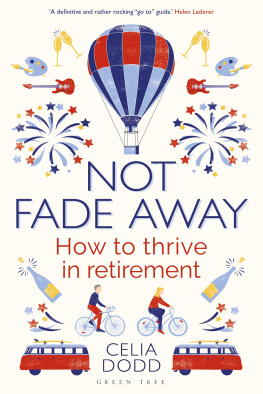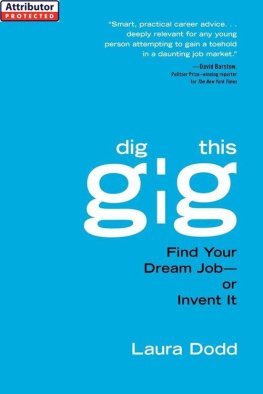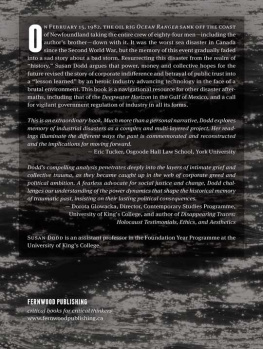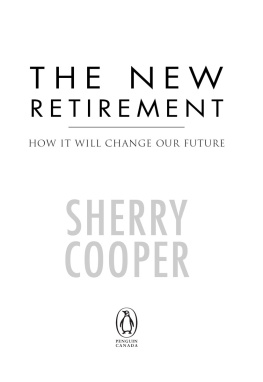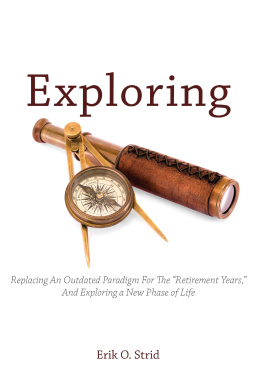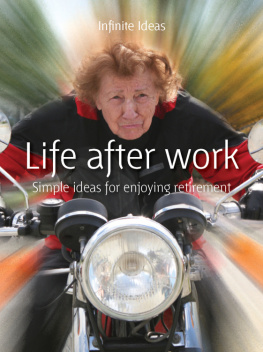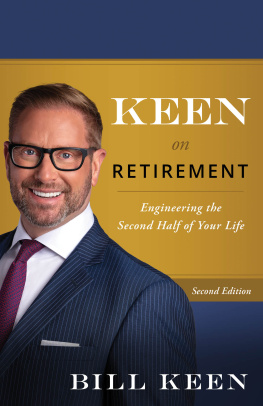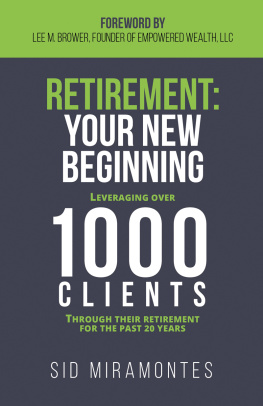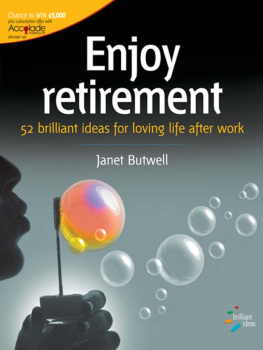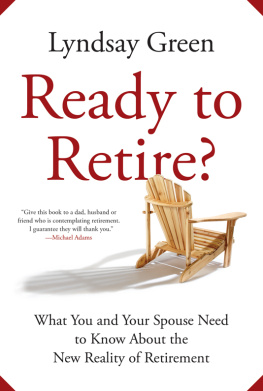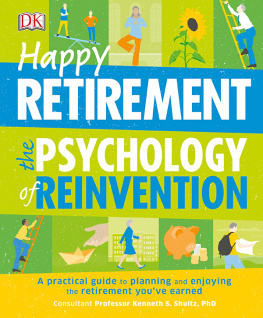
For Tom
and in memory of Kathleen and Cyril

Contents
When researching a book or a feature there is often a turning point when suddenly all the parts of the jigsaw fall into place. Its always a thrilling moment. Someone describes an experience or a feeling during an interview that hits the nail on the head, and youre off. With this book it happened so many times that Ive lost count. So I owe a huge debt of thanks to all the men and women who shared their experiences of retirement good, bad, challenging and sad so openly and articulately with me. I also want to thank the sociologists, psychologists, psychotherapists, financial and retirement experts who were incredibly generous with their time, knowledge and wisdom.
Thank you also to executive coach Lisa Zeff for helping me to see the wood from the trees, financial adviser Carol Higgin-Jones for reading the manuscript, and Esther Goodwin Brown of the Calouste Gulbenkian Foundation. Alison Cahn of Lancaster Cohousing went the extra mile in helping to organise my visit, and I am very grateful to her and everyone at LCH for their warm welcome.
Finally, a big thank you to my agent, Laura Longrigg at MBA, for her enduring support and to Charlotte Croft at Bloomsbury for her insightful editing and enthusiasm for this project from the word go. Thanks also to the rest of the wonderful team at Bloomsbury, especially Sarah Connelly, Holly Jarrald, the copy editor Mandy Woods and the proofreader Jenni Davis.
Retirement is a time of new opportunities, of finally being able to say yes rather than no, of spending time doing all those things you always wished you had more time for during the working week. Its a time for huge personal growth, when you can discover the real you, untrammelled by the demands of a working existence that has helped to shape the way you have thought, felt and behaved for decades.
So why do so many people find retirement tough? Why should giving up work, which is stressful, exhausting and relentless, be such a challenge? Why do people feel lost, overwhelmed and even depressed without it? Its almost as if were addicted to work. In some ways perhaps we are. Work is such a big part of our lives for such a long time that its hard to leave it behind. And for all its negative aspects its a source of deep satisfaction, independence and personal development. Midwife Linda Abbott, whose retirement was watched by millions on BBC1s One Born Every Minute , says, Work gives you a huge sense of fulfilment which is almost impossible to get from anything else. I think the shift from that sense of purpose is a very difficult one to make.
I share Lindas view. Thats partly what drove me to write this book to find answers to a question Ive wrestled with for years: how do people find fulfilment and meaning beyond paid work? Earning a wage doesnt just pay the rent; being paid gives what you do a seal of approval, it says it has value. So when money is taken out of the equation, how can individuals find meaning in what they do? This seems to me one of retirements fundamental questions.
As a child of the Sixties Ive always liked to think that money is less important than the other things that make a job worth doing. But increasingly Ive had to admit that for me, and I suspect for many people, money is not only a powerful motivator, its almost inseparable from job satisfaction and a sense of fulfilment. The problem is that because work takes up so much time and energy its easy to lose sight of the infinite possibilities that lie beyond it. Ellen Langer, Professor of Psychology at Harvard University, says, Retirement is a dirty word because people see it as the end, a phase where you do nothing. If you change jobs you go from Job A to Job B. Retirement has no B attached to it. So before they retire, people think about all the things they wont have to do. They say, Itll be nice not working, not being stressed, not having to get up early, not having to write these reports Thats very different from Itll be nice to read more or learn photography or spend more time with friends. The antidote is to see retirement as a change rather than a movement towards nothing.
You may well be reading this because you or your partner, or both of you, are about to retire, which puts you at about my age 64. If so, youll be aware of how much retirement has changed since our parents and grandparents stopped work. Its no longer a single, easy-to-grasp concept; instead, its become a mind-boggling mixed bag of possibilities that is as likely to include a combination of paid and unpaid work as no work at all. Its become a whole new life stage rather than a brief coda. Retired people today are a force: they wont give up trying to change the world, theyre still dancing round their kitchens, still working, still trying to find themselves.
Yet the image of retirement remains firmly stuck in the past. The word still conjures up pictures of elderly people enjoying a well-earned rest think retirement homes. When people say theyre retired I feel sorry for them, a friend said to me the other day. She made me do a double take, because thats how I used to feel myself until the people in this book turned my ideas upside down, that is. Part of the problem is that attitudes to retirement have failed to catch up with the new reality. So its not surprising that people are in denial about the R word, and it seems to get worse the nearer they get to retiring themselves. Tavistock Relationships in London, which has an international reputation for its couples therapy and counselling services, recently advertised counselling as part of a new programme to prepare couples for retirement. Initially they were shocked by the poor response. It was only when they took out the word Retirement and renamed it Couple 50+ MOT that more people came forward.
Retirement feels out of sync in a world that places a high premium on being purposeful and busy, and where being stressed out is not just the norm but almost a marker of success. Ian Stuart-Hamilton, Professor of Developmental Psychology at the University of Glamorgan, says, We have become so obsessed over the past few decades with working hard and the idea of the go-getter that retirement because its the antithesis of that is seen as giving up. There are more than enough role models now of people who are ploughing on long past retirement age, like Warren Buffett. The danger is that once you get trapped into that mindset retirement then seems like a kind of failure.
Professor Stuart-Hamilton makes an important point. Where are the good role models for retirement? There is no shortage of inspiring images of people in their 60s, 70s, 80s and 90s. Meryl Streep and Richard Branson and the entire cast of the Best Exotic Marigold Hotel are fine examples, but they are all still working their socks off. Its great to have such positive images, but the unintentional side effect is to make retired people feel even smaller than they do already. Meanwhile, the standard images of handsome silver foxes and women with stylish grey bobs on pensions adverts bear little relation to what retired people really look like these days. And its rare to read positive stories about real retirements in the mainstream media. Theres a gap, which this book sets out to fill.
People have been slow to grasp that what sets retired people apart is a fierce individuality in the way they think and dress and choose to spend their time. Thats because, perhaps for the first time in their lives, they no longer have to conform to the expectations of the workplace, which influence our behaviour more than we like to admit. Retirement is a fantastic opportunity to be yourself .

